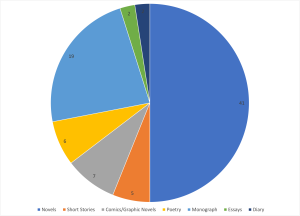As the new year progresses, and the presidential inauguration draws near, I, like all of us, am attempting to adjust to new realities. This is not easy. I’m not going to write about the election, as such; I am still without anything really useful to say about it, and I have no desire to add to the air of panic and anxiety that has settled on my news feeds.
That said, it seems clear to me that the election of Donald Trump is both a signal and a product, in part, of failures of communication. On the one had there is the failure to predict the outcome, driven at least in part by the fact that opinion polls sample people considered “likely voters,” and Trump was elected in part because a lot of unlikely voters turned out. Pollsters were not talking to the right people. More troubling, though, is the gap between the worldviews of Trump’s supporters and his opponents. This involves, but is deeper than, different values or priorities; increasingly, people have utterly different and incommensurable pictures of the world in which we live. Fake news (and “fake news”), filter bubbles, simple media bias— all of it erodes the common ground necessary for any kind of debate or discussion. The result is an understanding of the political process, even a democratic political process, as winner-take-all; the majority (or, in this case, a minority benefitting from anti-majoritarian institutions) is the winner, and gets to do whatever it wants until the next election. This is a pattern common to pseudo-democratic states like Nigeria, and it is the source of much of the conflict there: because losing an election means being cut out entirely from the support and attention of the government, the stakes are too high for people to simply accept a loss at the polls. The danger is that this is now becoming the pattern of American elections as well. Avoiding that means finding ways to talk to each other again.
Thinking about all of this made has anything about communication or language stand out to me for the last few weeks. None of these are about the election or even politics (at least, not directly), but they are all about how we talk to each other, or fail to do so.
“Chomsky, Wolfe, and Me” by Daniel Everett describes the academic and popular reaction to Everett’s claim that the language of the Pirahã— a small tribe living in the Brazilian Amazon— lacks grammatical recursion. Recursion, basically, is placing a grammatical element into another element of the same type, especially a sentence within a another sentence. I’ve done it multiple times already in this post, but an example might be “The gift that Paul gave to Lucy was bought at the store where Anna found the gift that she gave Joe.” That sentence contains the smaller sentences “Paul gave a gift to Lucy,” “Paul bought a gift at a store,” “Anna bought a gift at a store,” and “Anna gave a gift to Joe,” all distinguished, in this case, by relative that pronouns “that” or “where.” Without recursion, the idea would have to be expressed through those kinds of smaller sentences. Recursion allows, in principle, for a statement to be extended indefinitely with more and more subordinate clauses, though in practice sentences become too confusing after a certain point. Everett’s claim, after years living among the Pirahã and learning their language (which is an isolate, unrelated to any other language on earth), is that they do not do this, and even that, if they reach adulthood speaking only Pirahã, they never really learn to do it in another language, like Portuguese. He doesn’t believe that they are cognitively incapable of it, or in different in any physiological way from people who speak languages that include recursion (which, by the way, may be every other language on earth). The lack of recursion is a product of environment, not nature or biology, but growing up in that environment shapes their thinking in ways that make it very difficult to pick up the use of recursion later.
This all sounds pretty technical, and it is, so it’s surprising that Everett and his claims have garnered as much mainstream attention as they have. I heard about him first in a 2007 feature article in the New Yorker (which is also well worth reading), and more recently Tom Wolfe has written a book on the debates around Everett’s claims. One reason for this attention is that the debates fit fairly neatly into a David and Goliath narrative, and many people are attracted to the defense of Davids; the other is that the Goliath in this case is Noam Chomsky, who is well-known and controversial in his own right. Essentially, the issue is that Chomsky’s most recent statement of his theory of Universal Grammar (which was a genuine paradigm shift in linguistics back in the 1960s and 70s) posits recursion as a fundamental aspect of human language— maybe the fundamental aspect. Thus Everett’s claims about Pirahã seem to be a direct challenge to the most influential linguistic theory of the 20th century. There are at least two distinct questions here: first, is Everett actually right about the lack of recursion in Pirahã; second, does Chomsky’s theory demand that all languages include recursion, or simply that human language, in the abstract, has this capacity, uniquely among animal communications. (As Everett points out, the latter option would seem to mean that “language” has recursion even if languages don’t, which makes the theory empirically impossible to verify— or to falsify).
The debate is also, however, how the norms of academic exchange (openness to criticism and peer review, disinterested assessment of data and conclusions, etc.) clash with the self-interest of academics themselves. Many people are deeply invested in Chomsky’s approach (not least Chomsky himself); many others are equally invested in its being wrong. None of those investments have an affect whether Everett is right or not about Pirahã, but they have shaped the response to it, which has been surprisingly intense. As Everett puts it:
Although I realised that what I had written might be controversial, I was unprepared for the sheer number of academic papers, books and ad hominem attacks on me that have raged now for more than a decade provoked by that article. According to the different extremes in this debate, I am either an irrelevant, mistaken charlatan (Chomsky, in the Brazilian newspaper Folha de São Paulo, February 2009) or an ‘instant folk hero’ who knocked all the wind from Chomsky’s work on universal grammar as no one before had ever done (Wolfe, in Harper’s Magazine, August 2016).
I’m not in any position to weigh in on the substance of the debate here; I’m not a linguist, and I wouldn’t understand the details of any of it. What ‘m interested in here is, again, the interaction between the way academic research and debate are supposed to work, and the intellectual and professional investments of the participants that prevent this from happening. There’s nothing new about this, as Everett points out, and nothing unique to academia. But it means that the participants in the exchange are often talking at cross-purposes, and that different questions get conflated or distorted as a result. The question of whether Pirahã features recursion or not is an empirical one, and the standards by which it could be disproves are clear: go listen to native speakers using the language, collect examples, and see if they ever use it or not. For as long as nobody observes any examples of recursion, Everett’s theory is supported. This is all easier said than done, given where the Pirahã live and the difficulty of the language, but the principle is simple and not in dispute. The question of how much this matters for Chomsky’s theory is trickier, involving interpretation of his statements about the importance of recursion, but in any case it shouldn’t, in principle, be impossible to come to some kind of consensus about what kind of a challenge Everett’s work represents— especially since Chomsky is still alive and active and can be called upon to explain his ideas. But when all of this gets framed as Everett’s attempt to refute or denounce Chomsky and his supporters, themselves, then it becomes a different kind of argument; it’s about people, their credibility and the validity of their work and their careers, and that is not only inherently more fraught but also makes resolving the more basic questions much more difficult. Add to that the fact of Chomsky’s prominence as a commentator on politics, and the controversy of his ideas and his personality in that area, and you add another level at which personal and political investments frame the debate in different ways for different people. The participants in the controversy are, in a sense, often mistaken, or in disagreement, about which of these various arguments they are having.
To perhaps stretch the analogy here, there is something like this going on in the discussion of the election, both before and after. People on all sides are not simply disagreeing about the facts, or about their priority. Disagreements of that kind are fundamental to politics; they might even be the definition of politics. We also disagree on what we are having arguments about, in the first place. Is the debate about climate change an argument about scientific facts, or economic priorities, or partisan identity? People who think it is the latter aren’t simply disagreeing with the people who think it’s a matter of science about the facts themselves (though they do that as well); they believe that the whole controversy is a matter of political “interests” and the effort to control the power of the state, and the incompatibility of those two ways of farming the issue makes it difficult if not impossible to actually have a debate about it. Put another way, if you want to convince people that climate change is a problem by using science, they first have to believe that scientific fact is what is at stake in the discussion. If they don’t, the argument can’t go anywhere on those terms. Partisanship and division in society make this kind of problem of talking at cross-purposes more and more likely.
Reading about the rise of the feuilleton and the level of anxiety it caused among certain writers highlighted for me another aspect of these concerns. The feuilleton, appearing first in France in the middle of the 19th century, was a short piece of relatively informal, personal writing in a newspaper; they were usually lightly philosophical and often humorous observations about a world undergoing dramatic changes through industrialization and the growth of consumer capitalism. (The word was also used to refer to the section in which such pieces appeared). The feuilleton was very popular, and people who wrote them sometimes became well-known and well-paid. Those traits probably make opposition to the form inevitable, and some of it was predictably snobbish. The response of Walter Benjamin, though, was a bit more sophisticated. His concern, put probably too simply, was that the feuilleton made discontent and anxiety about the dislocations of resulting from economic change into a palatable consumer product; one could read a witty satirical piece about the changing society, and feel both entertained and superior without being urged to actually do anything about it. As Alexander Stern writes of one particular example of the form:
Despite the fact that Tucholsky’s feuilleton seems to satirize a superficial and compulsive element in the culture, the piece, from Benjamin’s point of view, simply becomes another item like the ones it lists. It doesn’t indict the culture, it teases it. This gentle satire—which finds current analogs not just in humor pieces and op-eds but also TV shows like HBO’s Silicon Valley—transforms discontent into consumption, dissipates political energy, and even normalizes the object of satire.
Reading this, it struck me that the issue with hyperpartisan media sources is not simply that they are so partisan, or even that they may distort the facts, but that partisanship, a particular political stance or worldview, is part of what they are selling. Reading them makes one feel part of something larger, and, maybe more importantly, feels like doing something. Reading a site or article with a particular stance, and agreeing with it, can feel like taking a stance, like making a statement; posting the article to Facebook feels even more active. The consumption of information or ideas, however dubious, ceases to be a passive act and becomes virtuous in its own right. Having engaged in such action then makes doing anything else seem superfluous; one has already stated ones position. Most importantly, having a serious discussion about an issue, or simply acknowledging its complexity or the validity of the people who differ with oneself, complicates and may even prevent this feeling by suggesting that simply agreeing with a particular statement of the issue is sufficient. This might be taking the point too far, but I might even argue that the more clearly partisan the source, the more it is simply selling this feeling, rather than any particular idea or piece of information. Again, the larger effect is to inhibit communication, simply because communication is harder than consumption, and mostly we are all pretty lazy.
I don’t really have any particular conclusion about all of this; I’m probably just as guilty of being in a bubble as anybody. But it does seem to me that if things are going to get better we need to find ways of taking each other seriously and talking to each other rather than treating people we disagree with as caricatures with whom communication is impossible.
Less connected to the rest of this, but also interesting things about communication: “Semaphore: The World’s First Telegraph” by Kaushik, about a system of mechanical visual signals for sending messages over long distances before the invention of the telegraph, and “The Race to Save a Dying Language” by Ross Perlin, about the efforts to record and preserve Hawaii Sign Language, a distinct form used by a very small number of people and threatened, as are many other forms of sign language all over the world, by the dominance of ASL.


